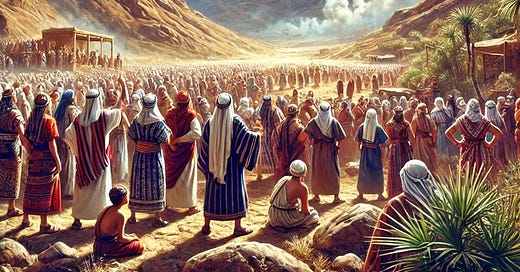Freedom carries an inherent tension: it is exhilarating yet terrifying. To be free is to be responsible, and responsibility means that one must own the consequences of one’s choices. It is no surprise, then, that after emerging from slavery, the Children of Israel are unsure of what to do with their newfound independence. Egypt was predictable; it had structure, hierarchy, and imposed order. Freedom, by contrast, is built upon license and liberty, which sound exciting; however, their undetermined and undefined nature can be frightening.
The Torah introduces law not as a limitation but as a structure that enhances freedom. This is why that as soon as Bene Yisrael leave Egypt, the first thing given to them are commandments. The moment Pharaoh says, 'Go,' God issues the commandments of Rosh Hodesh (Determining the New Moon) and Pesah, immediately establishing a framework for this nascent nation. Freedom, the Torah insists, cannot exist without law. For without the scaffolding that the commandments provide, the liberty to act as one wishes often does not include taking into account the consequences of those wishes. Without the Torah’s structure, freedom collapses into chaos or, worse, self-destruction.
According to the Torah, freedom is not a value in itself. In fact, nowhere in the text does it say that the people are being delivered for the sake of the their freedom. It facilitates a deeper purpose: engaging in a meaningful relationship with God through free will. Significantly, at Mount Sinai, God does not begin with commandments. Instead, He frames the commandments in the context of relationship. He thus insists that Moshe first deliver a strict preamble:
And Moses went up to the Lord. And God called to him from the mountain, saying, “Thus shall you say to the house of Jacob and declare to the children of Israel: You have seen what I did to Egypt, how I bore you on the wings of eagles and brought you to Me. And now, if you will truly listen to My voice and keep My covenant, you will be My treasured nation among all the peoples. (Exodus, 19:3-5)
Thus shall you say: With this language and in this order. (Rashi, ad loc)
Before mitsvot, before obligations, before even the details of the covenant itself, God says one thing: You are Mine, and I am yours. The Torah is not a system of rules; it is the framework of a relationship. Sinai is not just the giving of law; it is the creation of an eternal bond between God and Israel.
The Boundaries of Relationship
Relationships need boundaries. Without them, individuality fades and love may devolve into control or submission. And so, before the Torah is given, God is hyper-sensitive to boundaries. He tells Moshe, repeatedly, (ibid. 19:20-24) Make sure they don’t break the boundary. Make sure they don’t rush the mountain. Make sure they don’t lose themselves in rapture.
The greatest threat to this relationship is not rebellion or disobedience—it is losing oneself in it. Merging into God, erasing selfhood in divine ecstasy, may seem like the height of spirituality, but it is the opposite of what God wants. He does not want subjects; He wants partners. He does not want slaves; He wants individuals who freely choose to share themselves with Him.
Perashat Mishpatim extends this concept, presenting laws not just as rules but as frameworks to uphold boundaries in relationships. It tells us how to protect dignity, how to ensure justice, how to balance power, how to create a society where people remain distinct individuals while also forging meaningful connections. It warns against manipulation, control, and exploitation. It demands honesty, integrity, and respect. It is, in essence, a guidebook for love—both between people and between humanity and God.
Freedom and Love
And so, when the people hear all of this, they do not hesitate and proclaim in unison, Na’aseh ve’nishma—We will do, and we will listen. This is often interpreted as blind obedience, but that misses the point entirely. Na’aseh ve’nishma is not submission; it is love.
There is a midrash in the Talmud (Shabbat 88a) about a Sadducee who mocks Rava, a great rabbi of the Talmud, for being so engrossed in contemplating a particular halakhic issue that he did not realise his own fingers bleeding as he was leaning and pressing them against the bench upon which he sat. "You Jews are so impulsive," the Sadducee sneers. "If only you had thought before saying ‘Na’aseh ve’nishma’ at Sinai, maybe you wouldn’t be stuck with this burden of Torah."
Rava’s response is simple: We were in love.
It is a perfect answer. Love, real love, is not a calculated risk. It is not a series of pros and cons. It is a leap, an embrace, a commitment that precedes full understanding. When you know, you know. And the people of Israel knew. They heard the laws, saw the vision, and recognized that this was not about control, but about covenant.
Throughout Jewish history, this love has remained indestructible. There have been punishments, exiles, estrangements. But the bond has never broken. If it were merely about law, we would have abandoned it long ago. But it was never primarily about law. It was about love. And love—real, unconditional love—survives everything.
The remainder of the book of Exodus deals with the aftermath of that covenant. How God will travel with the people through history and how they must behave as a people in covenant with God.
Even now, thousands of years later, we return to Sinai every time we read these parashiyot. And we hear, once again, the voice that says, I bore you on the wings of eagles and brought you to Me. The voice that reminds us that Torah is not just law, but relationship. Not just obligation, but devotion. Not just rules, but love.





Outstanding Haham Dweck
Thank you
Not saying right or wrong- but contra maimonides